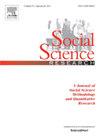Men's decline and rising support for hostile sexism: A survey experiment from South Korea
IF 3.5
2区 社会学
Q1 SOCIOLOGY
引用次数: 0
Abstract
Hostile sexism, characterized by derogatory views of women as incompetent and manipulative, is gaining recognition as a significant predictor of social and political trends in high-income countries. This article proposes that men's endorsement of hostile sexism is partially explained by the social trends that signal a loss of traditional male privileges, such as marriage or employment opportunities. To test this argument, 1028 Korean men were randomly allocated into three groups: the first received no information, the second was informed of an increase in the proportion of men who never marry, and the third was informed about rising unemployment rates. Participants were then asked to share their views on women, men, and society. In the general sample, support for hostile sexism was not higher among those exposed to these threats compared to the control group. However, among men who reported downward mobility, the results differed significantly. Those presented with scenarios of declining marriage and job opportunities exhibited much higher support for hostile sexism than their counterparts in the control condition. Additionally, within this group of downwardly mobile men, those who received information specifically about declining marriage prospects also reported greater hostility toward other men. Interestingly, despite this increase in gender-specific hostility, these men did not display more negative views toward Korean society in general. In summary, the study shed light on how men's grievances regarding the erosion of traditional privileges, particularly in marriage, explain hostile attitudes towards both women and men. Importantly, it underscores the interaction of male entitlement and diminishing economic mobility as a fertile ground for hostile sexism.
男性对敌对性别歧视的支持率下降和上升:韩国的一项调查实验
敌意的性别歧视,其特征是贬斥妇女为无能和善于操纵的人,正逐渐被认为是高收入国家社会和政治趋势的重要预测因素。这篇文章提出,男性对敌意性别歧视的认可部分是由于社会趋势表明传统男性特权(如婚姻或就业机会)的丧失。为了验证这一观点,1028名韩国男性被随机分为三组:第一组没有得到任何信息,第二组被告知未婚男性比例上升,第三组被告知失业率上升。然后,参与者被要求分享他们对女性、男性和社会的看法。在一般样本中,与对照组相比,那些受到这些威胁的人对敌意性别歧视的支持并不高。然而,在那些向下移动的男性中,结果却大不相同。在婚姻和工作机会不断下降的情况下,那些人对敌意性别歧视的支持程度要高于对照组。此外,在这组向下流动的男性中,那些明确收到婚姻前景下降信息的人也报告了对其他男性的更大敌意。有趣的是,尽管针对性别的敌意有所增加,但这些男性并没有对韩国社会表现出更多的负面看法。总之,这项研究揭示了男性对传统特权(尤其是在婚姻方面)受到侵蚀的不满,如何解释了他们对女性和男性的敌对态度。重要的是,它强调了男性权利和日益减少的经济流动性之间的相互作用,是敌意性别歧视的沃土。
本文章由计算机程序翻译,如有差异,请以英文原文为准。
求助全文
约1分钟内获得全文
求助全文
来源期刊

Social Science Research
SOCIOLOGY-
CiteScore
4.30
自引率
4.00%
发文量
0
审稿时长
65 days
期刊介绍:
Social Science Research publishes papers devoted to quantitative social science research and methodology. The journal features articles that illustrate the use of quantitative methods in the empirical solution of substantive problems, and emphasizes those concerned with issues or methods that cut across traditional disciplinary lines. Special attention is given to methods that have been used by only one particular social science discipline, but that may have application to a broader range of areas.
 求助内容:
求助内容: 应助结果提醒方式:
应助结果提醒方式:


